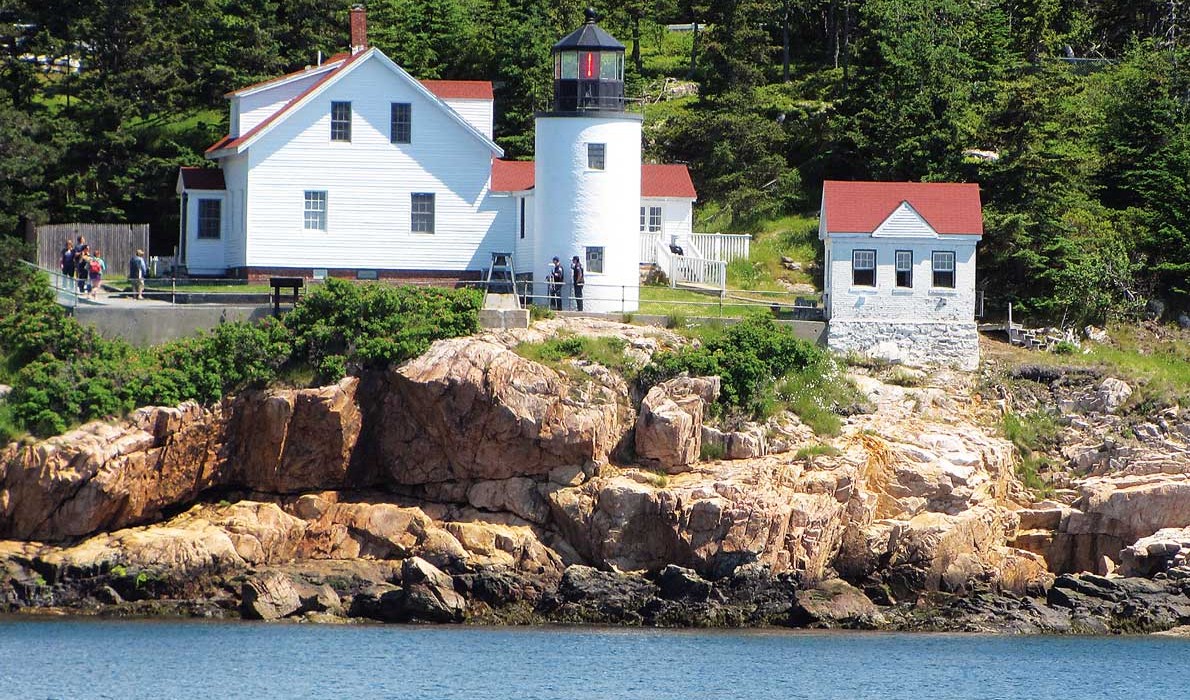Posted April 16, 2020
Last modified April 16, 2020
By Laurie Schreiber
Plans are in the works to transfer jurisdiction of the Bass Harbor Light Station from the U.S. Coast Guard to the National Park Service.
The plan would include a provision that allows the coast guard to continue to access the light and maintain the mechanical connections for it to continue as an aid to navigation, said Acadia National Park Management Assistant John Kelly. The proposed transfer was initiated by the Coast Guard.
“They make a determination whether they want to retain property or not,” Kelly said.
The two agencies began conversing in 2017. The transfer process is guided by the National Historic Lighthouse Preservation Act of 2000. The coast guard has been working toward divesting lighthouses for many years, said Kelly.
The property, which is already within Acadia National Park’s boundary, consists of 2.5 acres of land and six buildings—the light tower, keeper’s house, bell house, oil house, barn, and generator building. There’s also a 130-foot lattice communications tower.
Listed on the National Register of Historic Places in 1988, the 26-foot-high light tower and keeper’s house were built in 1858. The bell house was built in 1876, the oil house in 1902, and the barn in 1905.
According to the National Register listing, the light station was established during a period of increased effort by the federal government to provide aids to navigation along the coast. Its location was designed to aid vessels coming in to Bass Harbor. The station was automated in 1974.
Preserving the historic buildings is NPS’s highest priority, Kelly said. “Our first steps would be doing a comprehensive conditions assessment toward documenting the history of the building and the condition of the historic fabric,” he said. That would be followed by a process called a value analysis that looks at the cost/benefit of investment options while staying aligned with the goal to preserve the station for public enjoyment.
However, an NPS study of the condition of the structures can’t be performed until the transfer is complete. The NPS will also look at options for reusing the buildings.
“We have not gone through the process of deciding what those uses will be,” he said. However, he added the goal is to improve visitor access and understanding of the light station.
Some ideas include exhibits or a retail shop. There might be some interim uses that involve using the house for short-term or vacation rentals or, at least temporarily, as park housing.
The communications tower and the generator building are not historic and the NPS plans to remove them once the transfer is complete, said Kelly.
Acadia has two other lighthouses under its jurisdiction, on Baker Island and Bear Island off Mount Desert Island.
“Baker Island is under a lease without public access, and it’s remote and not easily accessed,” Kelly noted. “Bass Harbor Head Light is already a hugely popular destination. It’s the fifth most visited destination in the park, in fact, after Sieur de Monts, Jordan Pond, Cadillac Mountain, and Sand Beach.”
The Coast Guard doesn’t actually own the property, and neither will NPS. Properties under the jurisdiction of federal agencies are owned by the U.S. government. The agencies will transfer administrative jurisdiction.
The transfer, which has been three years in the work, also involves the U.S. General Services Administration, which supports basic functions of federal agencies.
It’s uncertain when the transfer will be completed.
“We’re cautiously waiting for the Coast Guard to finish its work,” he said. “The one thing the National Park Service needed to do was an environmental site assessment to ensure we’re not inheriting any hazardous contamination. We’ve completed that study. The property is clean and acceptable for us to take that jurisdiction when the Coast Guard is ready to sign it over. We’re hoping that will happen this spring.”
Contributed by




